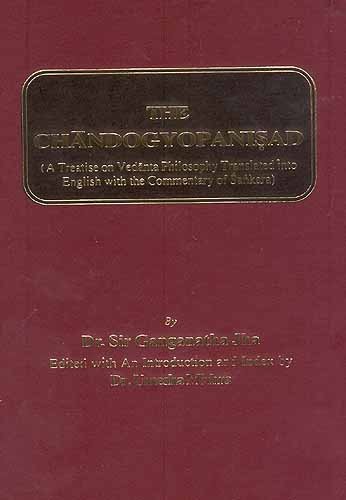Chandogya Upanishad (Shankara Bhashya)
by Ganganatha Jha | 1942 | 149,749 words | ISBN-10: 8170842840 | ISBN-13: 9788170842842
This is the English translation of the Chandogya Upanishad, an ancient philosophical text originally written in Sanksrit and dating to at least the 8th century BCE. Having eight chapters (adhyayas) and many sub-sections (khandas), this text is counted among the largest of it's kind. The Chandogya Upanishad, being connected to the Samaveda, represen...
Section 3.6 (sixth khaṇḍa) (four texts)
Upaniṣad text:
That which is the first nectar, upon that the Vasas live, through the lead of Agni. Verily, the deities do not eat nor do they drink; they are satisfied by merely looking upon this nectar.—(1)
Commentary (Śaṅkara Bhāṣya):
That which is the first nectar,—in the shape of the Red colour in the Sun,—upon that live the Vasus,—who are the masters of the ‘Morning Extraction’,—through the lead of Agni,—that is, with Agni as their leader, they live upon that nectar.—The statement that ‘the Essence becomes eatable food’ is likely to give rise to the idea that the Kosas eat the nectar as one eats morsels of food; hence the text proceeds to preclude such a notion—Verily, the Deities do not eat, nor do they drink.—Then how is it said that they live upon the nectar?—It means only this that they are satisfied by looking upon—perceiving by all the organs of perception,—the said nectar,—in the shape of the Red Colour.—That perception through all organs is what is meant by ’seeing here is indicated by the fact that the act of looking Stands for apprehension through all means of apprehension.
Objection.—“The expression used is ‘by looking upon the Red Colour; then how can the said colour be the object of perception through all organs of perception?”
Answer:—There is no force in this. Because ‘fame’ and other things mentioned are accessible to the auditory and other organs; for instance, Fame is perceptible by the auditory organ; Resplendence is perceptible by the visual organ; the Efficient Sense-organ is the efficiency of organs inferred from its apprehension of perceptible things; Strength, is power, physical energy.vigour;—Eatable food—is what is eaten day after day and conduces to the continuance of the body;—Essence is what consists of all these,—on seeing which all the deities become satisfied; which means that they become satisfied on perceiving all these through their organs of perception; depending upon the Sun, they are free from all such bodily defects as evil odour and the like—(1)
Upaniṣad text:
They retire into this colour; they rise from this colour.—(2)
Commentary (Śaṅkara Bhāṣya):
The question being—Do the Deities there remain idle, living upon the nectar?—The answer is—No; what happens is that they retire into this colour; that is, with reference to the said colour, they feel that it is not the occasion for their enjoyment, and hence they retire within it,—i.e., they remain neutral.—When the time comes for the enjoyment of the said nectar, then, out of this nectar—i.e. for the sake of this said nectar,—out of this colour, they rise, i.e., they become vigorous. Even in the ordinary ‘’world it is found that there is no enjoyment for persons who are idle, lacking energy and not doing anything,—(2)
Upaniṣad text:
One who knows this nectar thus becomes one of the Vasus, and through the lead of Agni becomes satisfied by looking upon this nectar; he retires into this colour and rises for this colour.—(3)
Commentary (Śaṅkara Bhāṣya):
He who knows this nectar thus—as described above—in the shape of the Ṛk, the Honey,—its being pressed,—the preservation of its Essence,—the flowing of Honey—out of the Actions prescribed in the Ṛgveda, as the flower,—its passing round the Sun,—its Red colour,—the fact of the nectar being located in the Bee-hive in the shape of the Eastern rays,—the fact of its being enjoyed by the Vasus,—the unification of the person knowing this with the —Vasus,—and through Agni as leader, this person being satisfied by merely looking on, rising on the occasion of their enjoyment, and retiring on the lapse of that occasion;—he who knows all this, enjoys all this, just like the Vasus.—(3)
Upaniṣad text:
As long as the Sun rises in the East and sets in the West, so long does he attain sovereignty of the Vasus, the kingdom of Heaven.—(4)
Commentary (Śaṅkara Bhāṣya):
It is now described for how long the knowing person lives upon the said nectar;—As long as the Sun rises in the East,—in the Eastern quarter,—and sets in the West,—so long is the time of enjoyment for the Vasus; and so long does the man attain the. sovereignty of the Vasus, the kingdom of Heaven,—that is, he goes round to that position. He is not like the mere Ritualist (without know ledge) who resides (after death) in the Moon, dependent upon others, treated by the deities as their ‘food’; the knowing man, in fact, attains sovereignty and the kingdom of Heaven.
End of Section (6) of Discourse III.
